Navigating Japanese Business Etiquette: A Guide for Foreigners
VerifiedAdded on 2020/04/15
|11
|2041
|28
Essay
AI Summary
This essay examines the importance of business etiquette in Japan, especially for foreign entrepreneurs. It explores Japanese cultural nuances, including the significance of first impressions, business cards (Meishi), conversations, respect for elders, gift-giving, and the emphasis on community over individualism. The essay uses a case study of Emily, an Australian entrepreneur, to illustrate the practical application of these etiquettes when interacting with a potential Japanese client. It also analyzes cultural miscommunications using Hofstede's Framework, highlighting differences in masculinity vs. femininity, individualism vs. collectivism, power distance, and indulgence vs. restraint. The conclusion emphasizes the need for foreign businesses to understand and incorporate Japanese professional and behavioral etiquettes to build successful business relationships and expand their ventures in Japan. The essay includes various references to support its claims and arguments.
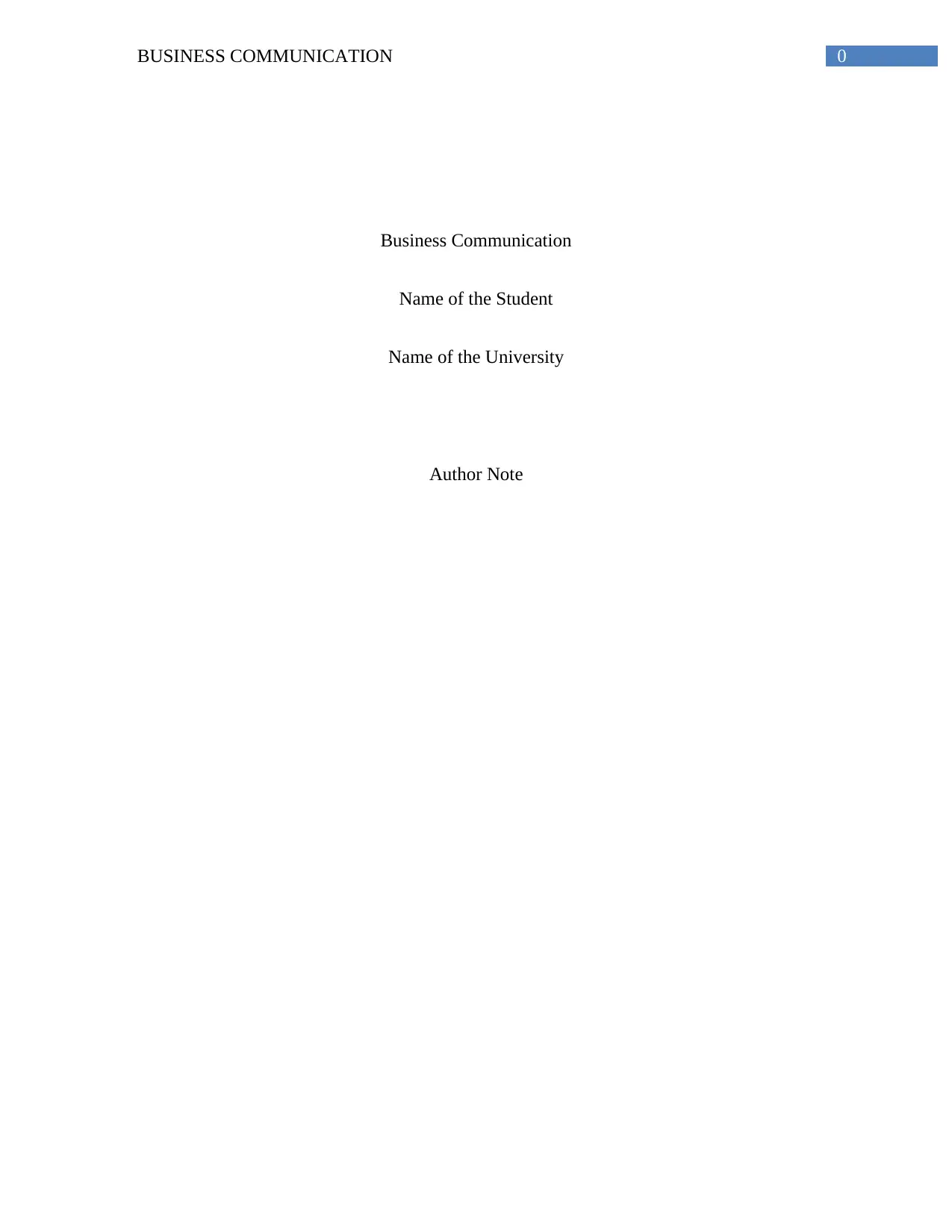
0BUSINESS COMMUNICATION
Business Communication
Name of the Student
Name of the University
Author Note
Business Communication
Name of the Student
Name of the University
Author Note
Paraphrase This Document
Need a fresh take? Get an instant paraphrase of this document with our AI Paraphraser
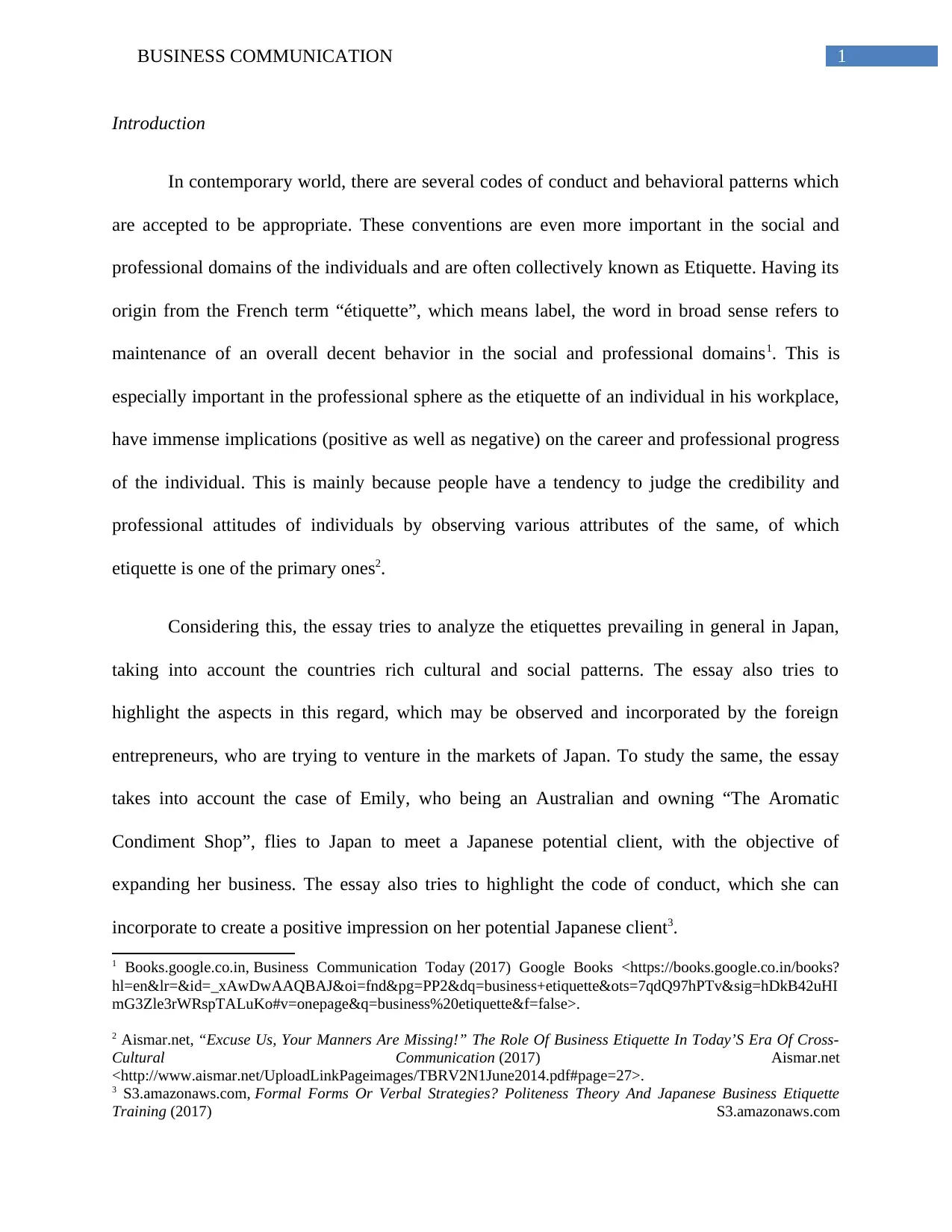
1BUSINESS COMMUNICATION
Introduction
In contemporary world, there are several codes of conduct and behavioral patterns which
are accepted to be appropriate. These conventions are even more important in the social and
professional domains of the individuals and are often collectively known as Etiquette. Having its
origin from the French term “étiquette”, which means label, the word in broad sense refers to
maintenance of an overall decent behavior in the social and professional domains1. This is
especially important in the professional sphere as the etiquette of an individual in his workplace,
have immense implications (positive as well as negative) on the career and professional progress
of the individual. This is mainly because people have a tendency to judge the credibility and
professional attitudes of individuals by observing various attributes of the same, of which
etiquette is one of the primary ones2.
Considering this, the essay tries to analyze the etiquettes prevailing in general in Japan,
taking into account the countries rich cultural and social patterns. The essay also tries to
highlight the aspects in this regard, which may be observed and incorporated by the foreign
entrepreneurs, who are trying to venture in the markets of Japan. To study the same, the essay
takes into account the case of Emily, who being an Australian and owning “The Aromatic
Condiment Shop”, flies to Japan to meet a Japanese potential client, with the objective of
expanding her business. The essay also tries to highlight the code of conduct, which she can
incorporate to create a positive impression on her potential Japanese client3.
1 Books.google.co.in, Business Communication Today (2017) Google Books <https://books.google.co.in/books?
hl=en&lr=&id=_xAwDwAAQBAJ&oi=fnd&pg=PP2&dq=business+etiquette&ots=7qdQ97hPTv&sig=hDkB42uHI
mG3Zle3rWRspTALuKo#v=onepage&q=business%20etiquette&f=false>.
2 Aismar.net, “Excuse Us, Your Manners Are Missing!” The Role Of Business Etiquette In Today’S Era Of Cross-
Cultural Communication (2017) Aismar.net
<http://www.aismar.net/UploadLinkPageimages/TBRV2N1June2014.pdf#page=27>.
3 S3.amazonaws.com, Formal Forms Or Verbal Strategies? Politeness Theory And Japanese Business Etiquette
Training (2017) S3.amazonaws.com
Introduction
In contemporary world, there are several codes of conduct and behavioral patterns which
are accepted to be appropriate. These conventions are even more important in the social and
professional domains of the individuals and are often collectively known as Etiquette. Having its
origin from the French term “étiquette”, which means label, the word in broad sense refers to
maintenance of an overall decent behavior in the social and professional domains1. This is
especially important in the professional sphere as the etiquette of an individual in his workplace,
have immense implications (positive as well as negative) on the career and professional progress
of the individual. This is mainly because people have a tendency to judge the credibility and
professional attitudes of individuals by observing various attributes of the same, of which
etiquette is one of the primary ones2.
Considering this, the essay tries to analyze the etiquettes prevailing in general in Japan,
taking into account the countries rich cultural and social patterns. The essay also tries to
highlight the aspects in this regard, which may be observed and incorporated by the foreign
entrepreneurs, who are trying to venture in the markets of Japan. To study the same, the essay
takes into account the case of Emily, who being an Australian and owning “The Aromatic
Condiment Shop”, flies to Japan to meet a Japanese potential client, with the objective of
expanding her business. The essay also tries to highlight the code of conduct, which she can
incorporate to create a positive impression on her potential Japanese client3.
1 Books.google.co.in, Business Communication Today (2017) Google Books <https://books.google.co.in/books?
hl=en&lr=&id=_xAwDwAAQBAJ&oi=fnd&pg=PP2&dq=business+etiquette&ots=7qdQ97hPTv&sig=hDkB42uHI
mG3Zle3rWRspTALuKo#v=onepage&q=business%20etiquette&f=false>.
2 Aismar.net, “Excuse Us, Your Manners Are Missing!” The Role Of Business Etiquette In Today’S Era Of Cross-
Cultural Communication (2017) Aismar.net
<http://www.aismar.net/UploadLinkPageimages/TBRV2N1June2014.pdf#page=27>.
3 S3.amazonaws.com, Formal Forms Or Verbal Strategies? Politeness Theory And Japanese Business Etiquette
Training (2017) S3.amazonaws.com
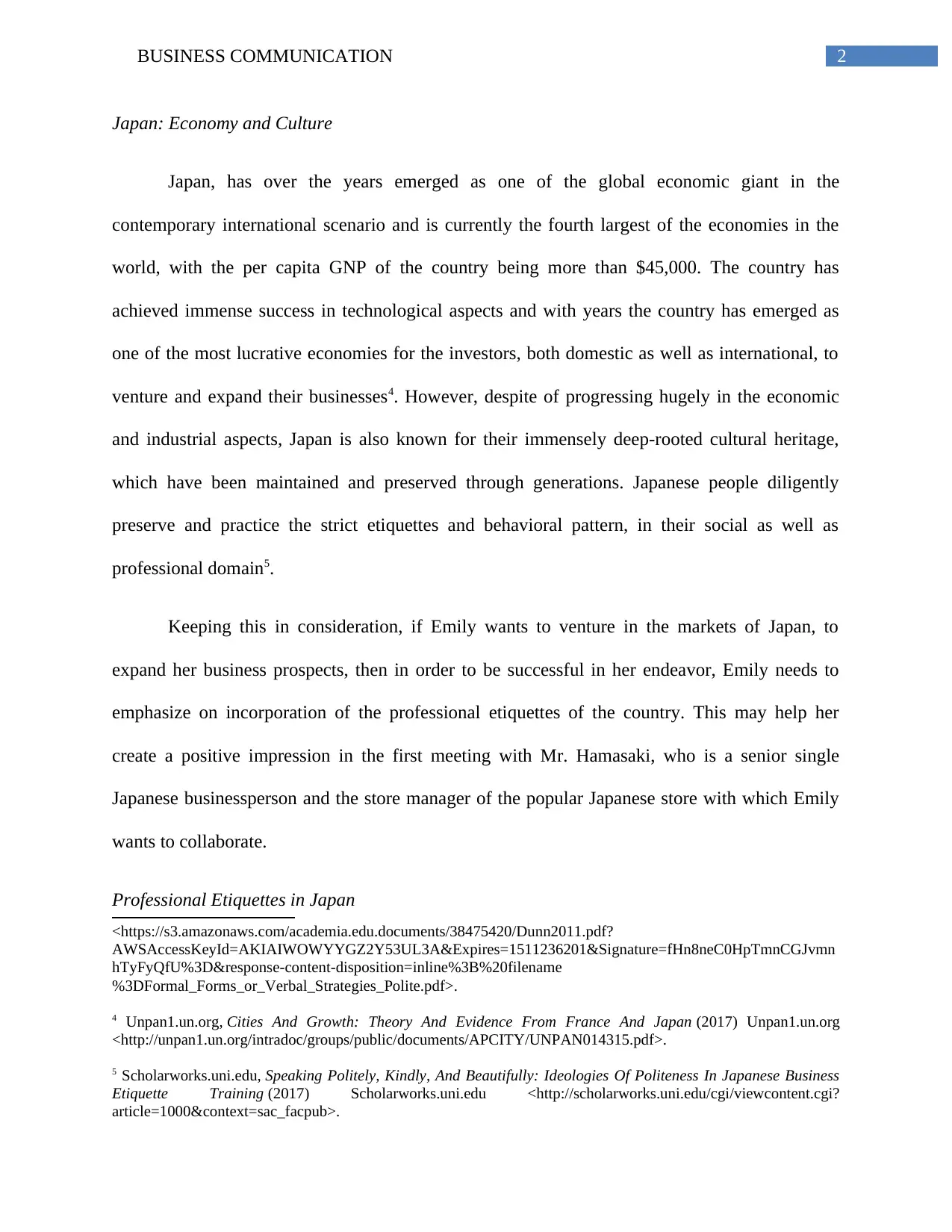
2BUSINESS COMMUNICATION
Japan: Economy and Culture
Japan, has over the years emerged as one of the global economic giant in the
contemporary international scenario and is currently the fourth largest of the economies in the
world, with the per capita GNP of the country being more than $45,000. The country has
achieved immense success in technological aspects and with years the country has emerged as
one of the most lucrative economies for the investors, both domestic as well as international, to
venture and expand their businesses4. However, despite of progressing hugely in the economic
and industrial aspects, Japan is also known for their immensely deep-rooted cultural heritage,
which have been maintained and preserved through generations. Japanese people diligently
preserve and practice the strict etiquettes and behavioral pattern, in their social as well as
professional domain5.
Keeping this in consideration, if Emily wants to venture in the markets of Japan, to
expand her business prospects, then in order to be successful in her endeavor, Emily needs to
emphasize on incorporation of the professional etiquettes of the country. This may help her
create a positive impression in the first meeting with Mr. Hamasaki, who is a senior single
Japanese businessperson and the store manager of the popular Japanese store with which Emily
wants to collaborate.
Professional Etiquettes in Japan
<https://s3.amazonaws.com/academia.edu.documents/38475420/Dunn2011.pdf?
AWSAccessKeyId=AKIAIWOWYYGZ2Y53UL3A&Expires=1511236201&Signature=fHn8neC0HpTmnCGJvmn
hTyFyQfU%3D&response-content-disposition=inline%3B%20filename
%3DFormal_Forms_or_Verbal_Strategies_Polite.pdf>.
4 Unpan1.un.org, Cities And Growth: Theory And Evidence From France And Japan (2017) Unpan1.un.org
<http://unpan1.un.org/intradoc/groups/public/documents/APCITY/UNPAN014315.pdf>.
5 Scholarworks.uni.edu, Speaking Politely, Kindly, And Beautifully: Ideologies Of Politeness In Japanese Business
Etiquette Training (2017) Scholarworks.uni.edu <http://scholarworks.uni.edu/cgi/viewcontent.cgi?
article=1000&context=sac_facpub>.
Japan: Economy and Culture
Japan, has over the years emerged as one of the global economic giant in the
contemporary international scenario and is currently the fourth largest of the economies in the
world, with the per capita GNP of the country being more than $45,000. The country has
achieved immense success in technological aspects and with years the country has emerged as
one of the most lucrative economies for the investors, both domestic as well as international, to
venture and expand their businesses4. However, despite of progressing hugely in the economic
and industrial aspects, Japan is also known for their immensely deep-rooted cultural heritage,
which have been maintained and preserved through generations. Japanese people diligently
preserve and practice the strict etiquettes and behavioral pattern, in their social as well as
professional domain5.
Keeping this in consideration, if Emily wants to venture in the markets of Japan, to
expand her business prospects, then in order to be successful in her endeavor, Emily needs to
emphasize on incorporation of the professional etiquettes of the country. This may help her
create a positive impression in the first meeting with Mr. Hamasaki, who is a senior single
Japanese businessperson and the store manager of the popular Japanese store with which Emily
wants to collaborate.
Professional Etiquettes in Japan
<https://s3.amazonaws.com/academia.edu.documents/38475420/Dunn2011.pdf?
AWSAccessKeyId=AKIAIWOWYYGZ2Y53UL3A&Expires=1511236201&Signature=fHn8neC0HpTmnCGJvmn
hTyFyQfU%3D&response-content-disposition=inline%3B%20filename
%3DFormal_Forms_or_Verbal_Strategies_Polite.pdf>.
4 Unpan1.un.org, Cities And Growth: Theory And Evidence From France And Japan (2017) Unpan1.un.org
<http://unpan1.un.org/intradoc/groups/public/documents/APCITY/UNPAN014315.pdf>.
5 Scholarworks.uni.edu, Speaking Politely, Kindly, And Beautifully: Ideologies Of Politeness In Japanese Business
Etiquette Training (2017) Scholarworks.uni.edu <http://scholarworks.uni.edu/cgi/viewcontent.cgi?
article=1000&context=sac_facpub>.
⊘ This is a preview!⊘
Do you want full access?
Subscribe today to unlock all pages.

Trusted by 1+ million students worldwide
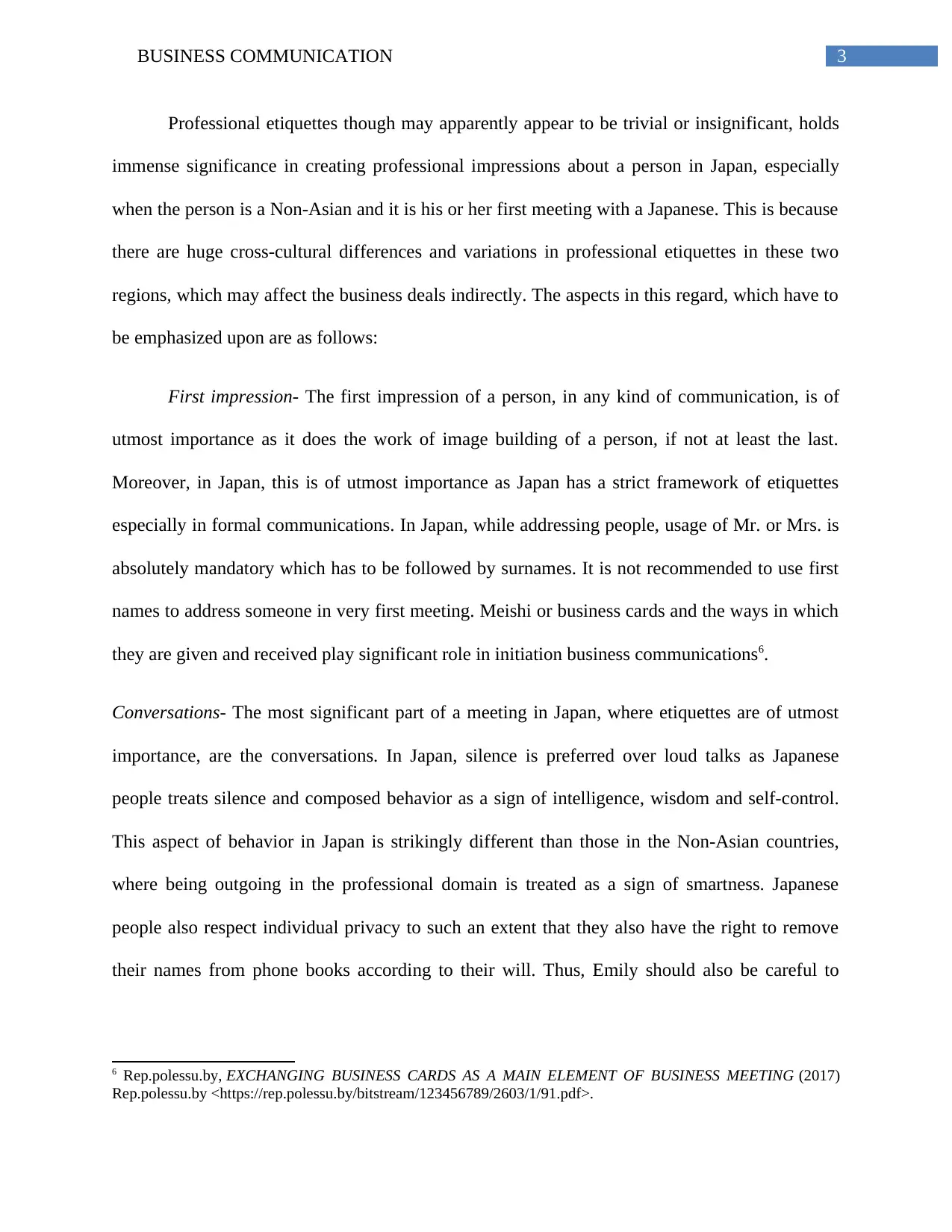
3BUSINESS COMMUNICATION
Professional etiquettes though may apparently appear to be trivial or insignificant, holds
immense significance in creating professional impressions about a person in Japan, especially
when the person is a Non-Asian and it is his or her first meeting with a Japanese. This is because
there are huge cross-cultural differences and variations in professional etiquettes in these two
regions, which may affect the business deals indirectly. The aspects in this regard, which have to
be emphasized upon are as follows:
First impression- The first impression of a person, in any kind of communication, is of
utmost importance as it does the work of image building of a person, if not at least the last.
Moreover, in Japan, this is of utmost importance as Japan has a strict framework of etiquettes
especially in formal communications. In Japan, while addressing people, usage of Mr. or Mrs. is
absolutely mandatory which has to be followed by surnames. It is not recommended to use first
names to address someone in very first meeting. Meishi or business cards and the ways in which
they are given and received play significant role in initiation business communications6.
Conversations- The most significant part of a meeting in Japan, where etiquettes are of utmost
importance, are the conversations. In Japan, silence is preferred over loud talks as Japanese
people treats silence and composed behavior as a sign of intelligence, wisdom and self-control.
This aspect of behavior in Japan is strikingly different than those in the Non-Asian countries,
where being outgoing in the professional domain is treated as a sign of smartness. Japanese
people also respect individual privacy to such an extent that they also have the right to remove
their names from phone books according to their will. Thus, Emily should also be careful to
6 Rep.polessu.by, EXCHANGING BUSINESS CARDS AS A MAIN ELEMENT OF BUSINESS MEETING (2017)
Rep.polessu.by <https://rep.polessu.by/bitstream/123456789/2603/1/91.pdf>.
Professional etiquettes though may apparently appear to be trivial or insignificant, holds
immense significance in creating professional impressions about a person in Japan, especially
when the person is a Non-Asian and it is his or her first meeting with a Japanese. This is because
there are huge cross-cultural differences and variations in professional etiquettes in these two
regions, which may affect the business deals indirectly. The aspects in this regard, which have to
be emphasized upon are as follows:
First impression- The first impression of a person, in any kind of communication, is of
utmost importance as it does the work of image building of a person, if not at least the last.
Moreover, in Japan, this is of utmost importance as Japan has a strict framework of etiquettes
especially in formal communications. In Japan, while addressing people, usage of Mr. or Mrs. is
absolutely mandatory which has to be followed by surnames. It is not recommended to use first
names to address someone in very first meeting. Meishi or business cards and the ways in which
they are given and received play significant role in initiation business communications6.
Conversations- The most significant part of a meeting in Japan, where etiquettes are of utmost
importance, are the conversations. In Japan, silence is preferred over loud talks as Japanese
people treats silence and composed behavior as a sign of intelligence, wisdom and self-control.
This aspect of behavior in Japan is strikingly different than those in the Non-Asian countries,
where being outgoing in the professional domain is treated as a sign of smartness. Japanese
people also respect individual privacy to such an extent that they also have the right to remove
their names from phone books according to their will. Thus, Emily should also be careful to
6 Rep.polessu.by, EXCHANGING BUSINESS CARDS AS A MAIN ELEMENT OF BUSINESS MEETING (2017)
Rep.polessu.by <https://rep.polessu.by/bitstream/123456789/2603/1/91.pdf>.
Paraphrase This Document
Need a fresh take? Get an instant paraphrase of this document with our AI Paraphraser
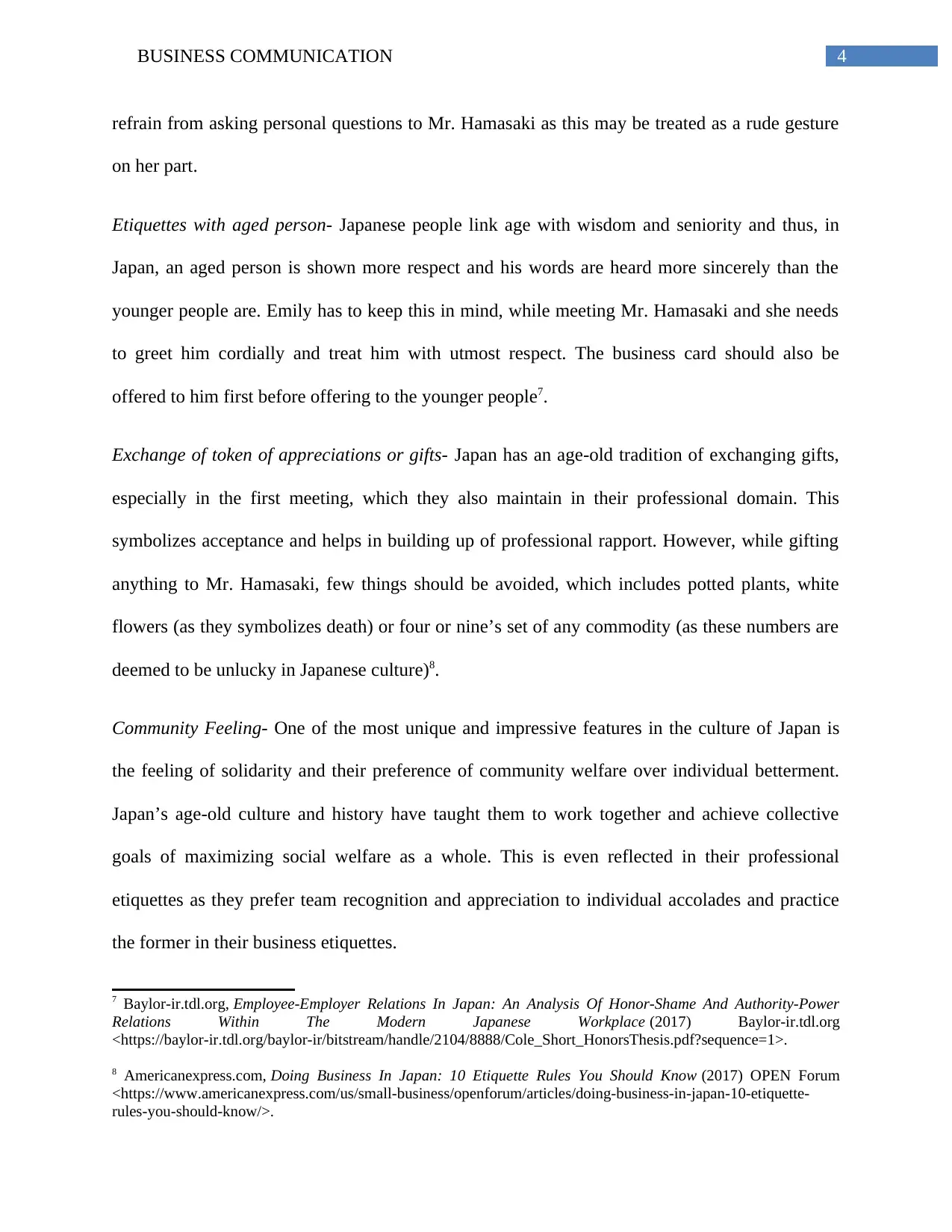
4BUSINESS COMMUNICATION
refrain from asking personal questions to Mr. Hamasaki as this may be treated as a rude gesture
on her part.
Etiquettes with aged person- Japanese people link age with wisdom and seniority and thus, in
Japan, an aged person is shown more respect and his words are heard more sincerely than the
younger people are. Emily has to keep this in mind, while meeting Mr. Hamasaki and she needs
to greet him cordially and treat him with utmost respect. The business card should also be
offered to him first before offering to the younger people7.
Exchange of token of appreciations or gifts- Japan has an age-old tradition of exchanging gifts,
especially in the first meeting, which they also maintain in their professional domain. This
symbolizes acceptance and helps in building up of professional rapport. However, while gifting
anything to Mr. Hamasaki, few things should be avoided, which includes potted plants, white
flowers (as they symbolizes death) or four or nine’s set of any commodity (as these numbers are
deemed to be unlucky in Japanese culture)8.
Community Feeling- One of the most unique and impressive features in the culture of Japan is
the feeling of solidarity and their preference of community welfare over individual betterment.
Japan’s age-old culture and history have taught them to work together and achieve collective
goals of maximizing social welfare as a whole. This is even reflected in their professional
etiquettes as they prefer team recognition and appreciation to individual accolades and practice
the former in their business etiquettes.
7 Baylor-ir.tdl.org, Employee-Employer Relations In Japan: An Analysis Of Honor-Shame And Authority-Power
Relations Within The Modern Japanese Workplace (2017) Baylor-ir.tdl.org
<https://baylor-ir.tdl.org/baylor-ir/bitstream/handle/2104/8888/Cole_Short_HonorsThesis.pdf?sequence=1>.
8 Americanexpress.com, Doing Business In Japan: 10 Etiquette Rules You Should Know (2017) OPEN Forum
<https://www.americanexpress.com/us/small-business/openforum/articles/doing-business-in-japan-10-etiquette-
rules-you-should-know/>.
refrain from asking personal questions to Mr. Hamasaki as this may be treated as a rude gesture
on her part.
Etiquettes with aged person- Japanese people link age with wisdom and seniority and thus, in
Japan, an aged person is shown more respect and his words are heard more sincerely than the
younger people are. Emily has to keep this in mind, while meeting Mr. Hamasaki and she needs
to greet him cordially and treat him with utmost respect. The business card should also be
offered to him first before offering to the younger people7.
Exchange of token of appreciations or gifts- Japan has an age-old tradition of exchanging gifts,
especially in the first meeting, which they also maintain in their professional domain. This
symbolizes acceptance and helps in building up of professional rapport. However, while gifting
anything to Mr. Hamasaki, few things should be avoided, which includes potted plants, white
flowers (as they symbolizes death) or four or nine’s set of any commodity (as these numbers are
deemed to be unlucky in Japanese culture)8.
Community Feeling- One of the most unique and impressive features in the culture of Japan is
the feeling of solidarity and their preference of community welfare over individual betterment.
Japan’s age-old culture and history have taught them to work together and achieve collective
goals of maximizing social welfare as a whole. This is even reflected in their professional
etiquettes as they prefer team recognition and appreciation to individual accolades and practice
the former in their business etiquettes.
7 Baylor-ir.tdl.org, Employee-Employer Relations In Japan: An Analysis Of Honor-Shame And Authority-Power
Relations Within The Modern Japanese Workplace (2017) Baylor-ir.tdl.org
<https://baylor-ir.tdl.org/baylor-ir/bitstream/handle/2104/8888/Cole_Short_HonorsThesis.pdf?sequence=1>.
8 Americanexpress.com, Doing Business In Japan: 10 Etiquette Rules You Should Know (2017) OPEN Forum
<https://www.americanexpress.com/us/small-business/openforum/articles/doing-business-in-japan-10-etiquette-
rules-you-should-know/>.
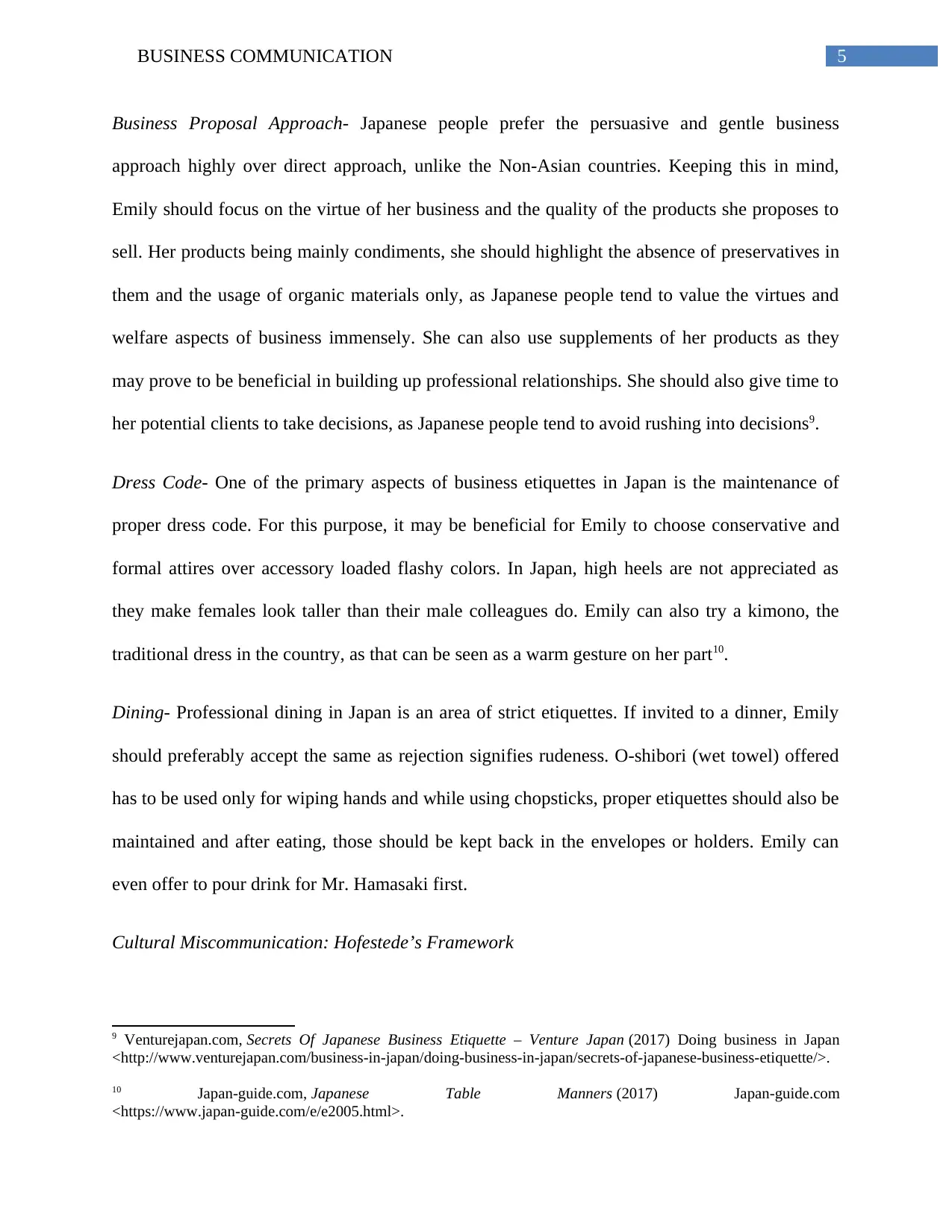
5BUSINESS COMMUNICATION
Business Proposal Approach- Japanese people prefer the persuasive and gentle business
approach highly over direct approach, unlike the Non-Asian countries. Keeping this in mind,
Emily should focus on the virtue of her business and the quality of the products she proposes to
sell. Her products being mainly condiments, she should highlight the absence of preservatives in
them and the usage of organic materials only, as Japanese people tend to value the virtues and
welfare aspects of business immensely. She can also use supplements of her products as they
may prove to be beneficial in building up professional relationships. She should also give time to
her potential clients to take decisions, as Japanese people tend to avoid rushing into decisions9.
Dress Code- One of the primary aspects of business etiquettes in Japan is the maintenance of
proper dress code. For this purpose, it may be beneficial for Emily to choose conservative and
formal attires over accessory loaded flashy colors. In Japan, high heels are not appreciated as
they make females look taller than their male colleagues do. Emily can also try a kimono, the
traditional dress in the country, as that can be seen as a warm gesture on her part10.
Dining- Professional dining in Japan is an area of strict etiquettes. If invited to a dinner, Emily
should preferably accept the same as rejection signifies rudeness. O-shibori (wet towel) offered
has to be used only for wiping hands and while using chopsticks, proper etiquettes should also be
maintained and after eating, those should be kept back in the envelopes or holders. Emily can
even offer to pour drink for Mr. Hamasaki first.
Cultural Miscommunication: Hofestede’s Framework
9 Venturejapan.com, Secrets Of Japanese Business Etiquette – Venture Japan (2017) Doing business in Japan
<http://www.venturejapan.com/business-in-japan/doing-business-in-japan/secrets-of-japanese-business-etiquette/>.
10 Japan-guide.com, Japanese Table Manners (2017) Japan-guide.com
<https://www.japan-guide.com/e/e2005.html>.
Business Proposal Approach- Japanese people prefer the persuasive and gentle business
approach highly over direct approach, unlike the Non-Asian countries. Keeping this in mind,
Emily should focus on the virtue of her business and the quality of the products she proposes to
sell. Her products being mainly condiments, she should highlight the absence of preservatives in
them and the usage of organic materials only, as Japanese people tend to value the virtues and
welfare aspects of business immensely. She can also use supplements of her products as they
may prove to be beneficial in building up professional relationships. She should also give time to
her potential clients to take decisions, as Japanese people tend to avoid rushing into decisions9.
Dress Code- One of the primary aspects of business etiquettes in Japan is the maintenance of
proper dress code. For this purpose, it may be beneficial for Emily to choose conservative and
formal attires over accessory loaded flashy colors. In Japan, high heels are not appreciated as
they make females look taller than their male colleagues do. Emily can also try a kimono, the
traditional dress in the country, as that can be seen as a warm gesture on her part10.
Dining- Professional dining in Japan is an area of strict etiquettes. If invited to a dinner, Emily
should preferably accept the same as rejection signifies rudeness. O-shibori (wet towel) offered
has to be used only for wiping hands and while using chopsticks, proper etiquettes should also be
maintained and after eating, those should be kept back in the envelopes or holders. Emily can
even offer to pour drink for Mr. Hamasaki first.
Cultural Miscommunication: Hofestede’s Framework
9 Venturejapan.com, Secrets Of Japanese Business Etiquette – Venture Japan (2017) Doing business in Japan
<http://www.venturejapan.com/business-in-japan/doing-business-in-japan/secrets-of-japanese-business-etiquette/>.
10 Japan-guide.com, Japanese Table Manners (2017) Japan-guide.com
<https://www.japan-guide.com/e/e2005.html>.
⊘ This is a preview!⊘
Do you want full access?
Subscribe today to unlock all pages.

Trusted by 1+ million students worldwide
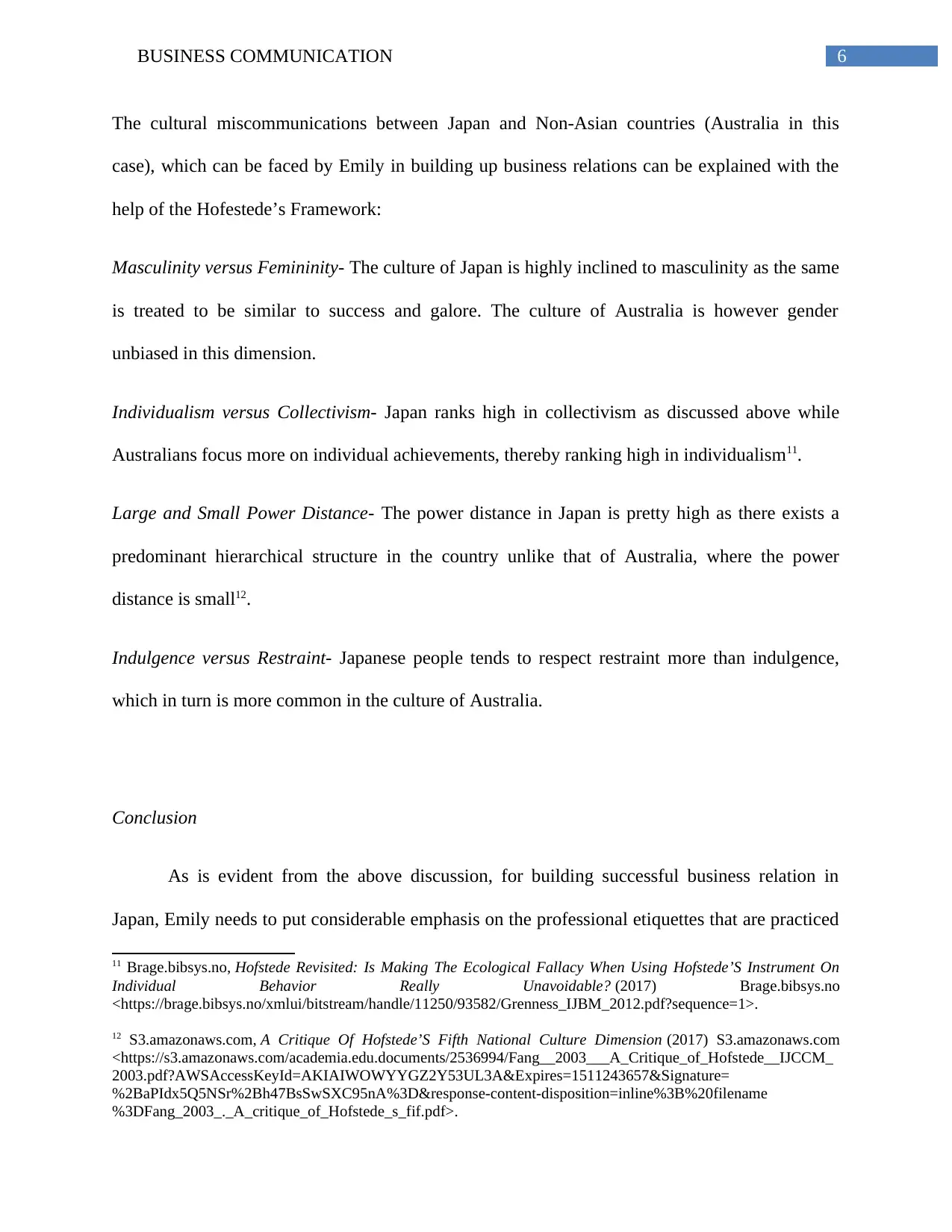
6BUSINESS COMMUNICATION
The cultural miscommunications between Japan and Non-Asian countries (Australia in this
case), which can be faced by Emily in building up business relations can be explained with the
help of the Hofestede’s Framework:
Masculinity versus Femininity- The culture of Japan is highly inclined to masculinity as the same
is treated to be similar to success and galore. The culture of Australia is however gender
unbiased in this dimension.
Individualism versus Collectivism- Japan ranks high in collectivism as discussed above while
Australians focus more on individual achievements, thereby ranking high in individualism11.
Large and Small Power Distance- The power distance in Japan is pretty high as there exists a
predominant hierarchical structure in the country unlike that of Australia, where the power
distance is small12.
Indulgence versus Restraint- Japanese people tends to respect restraint more than indulgence,
which in turn is more common in the culture of Australia.
Conclusion
As is evident from the above discussion, for building successful business relation in
Japan, Emily needs to put considerable emphasis on the professional etiquettes that are practiced
11 Brage.bibsys.no, Hofstede Revisited: Is Making The Ecological Fallacy When Using Hofstede’S Instrument On
Individual Behavior Really Unavoidable? (2017) Brage.bibsys.no
<https://brage.bibsys.no/xmlui/bitstream/handle/11250/93582/Grenness_IJBM_2012.pdf?sequence=1>.
12 S3.amazonaws.com, A Critique Of Hofstede’S Fifth National Culture Dimension (2017) S3.amazonaws.com
<https://s3.amazonaws.com/academia.edu.documents/2536994/Fang__2003___A_Critique_of_Hofstede__IJCCM_
2003.pdf?AWSAccessKeyId=AKIAIWOWYYGZ2Y53UL3A&Expires=1511243657&Signature=
%2BaPIdx5Q5NSr%2Bh47BsSwSXC95nA%3D&response-content-disposition=inline%3B%20filename
%3DFang_2003_._A_critique_of_Hofstede_s_fif.pdf>.
The cultural miscommunications between Japan and Non-Asian countries (Australia in this
case), which can be faced by Emily in building up business relations can be explained with the
help of the Hofestede’s Framework:
Masculinity versus Femininity- The culture of Japan is highly inclined to masculinity as the same
is treated to be similar to success and galore. The culture of Australia is however gender
unbiased in this dimension.
Individualism versus Collectivism- Japan ranks high in collectivism as discussed above while
Australians focus more on individual achievements, thereby ranking high in individualism11.
Large and Small Power Distance- The power distance in Japan is pretty high as there exists a
predominant hierarchical structure in the country unlike that of Australia, where the power
distance is small12.
Indulgence versus Restraint- Japanese people tends to respect restraint more than indulgence,
which in turn is more common in the culture of Australia.
Conclusion
As is evident from the above discussion, for building successful business relation in
Japan, Emily needs to put considerable emphasis on the professional etiquettes that are practiced
11 Brage.bibsys.no, Hofstede Revisited: Is Making The Ecological Fallacy When Using Hofstede’S Instrument On
Individual Behavior Really Unavoidable? (2017) Brage.bibsys.no
<https://brage.bibsys.no/xmlui/bitstream/handle/11250/93582/Grenness_IJBM_2012.pdf?sequence=1>.
12 S3.amazonaws.com, A Critique Of Hofstede’S Fifth National Culture Dimension (2017) S3.amazonaws.com
<https://s3.amazonaws.com/academia.edu.documents/2536994/Fang__2003___A_Critique_of_Hofstede__IJCCM_
2003.pdf?AWSAccessKeyId=AKIAIWOWYYGZ2Y53UL3A&Expires=1511243657&Signature=
%2BaPIdx5Q5NSr%2Bh47BsSwSXC95nA%3D&response-content-disposition=inline%3B%20filename
%3DFang_2003_._A_critique_of_Hofstede_s_fif.pdf>.
Paraphrase This Document
Need a fresh take? Get an instant paraphrase of this document with our AI Paraphraser
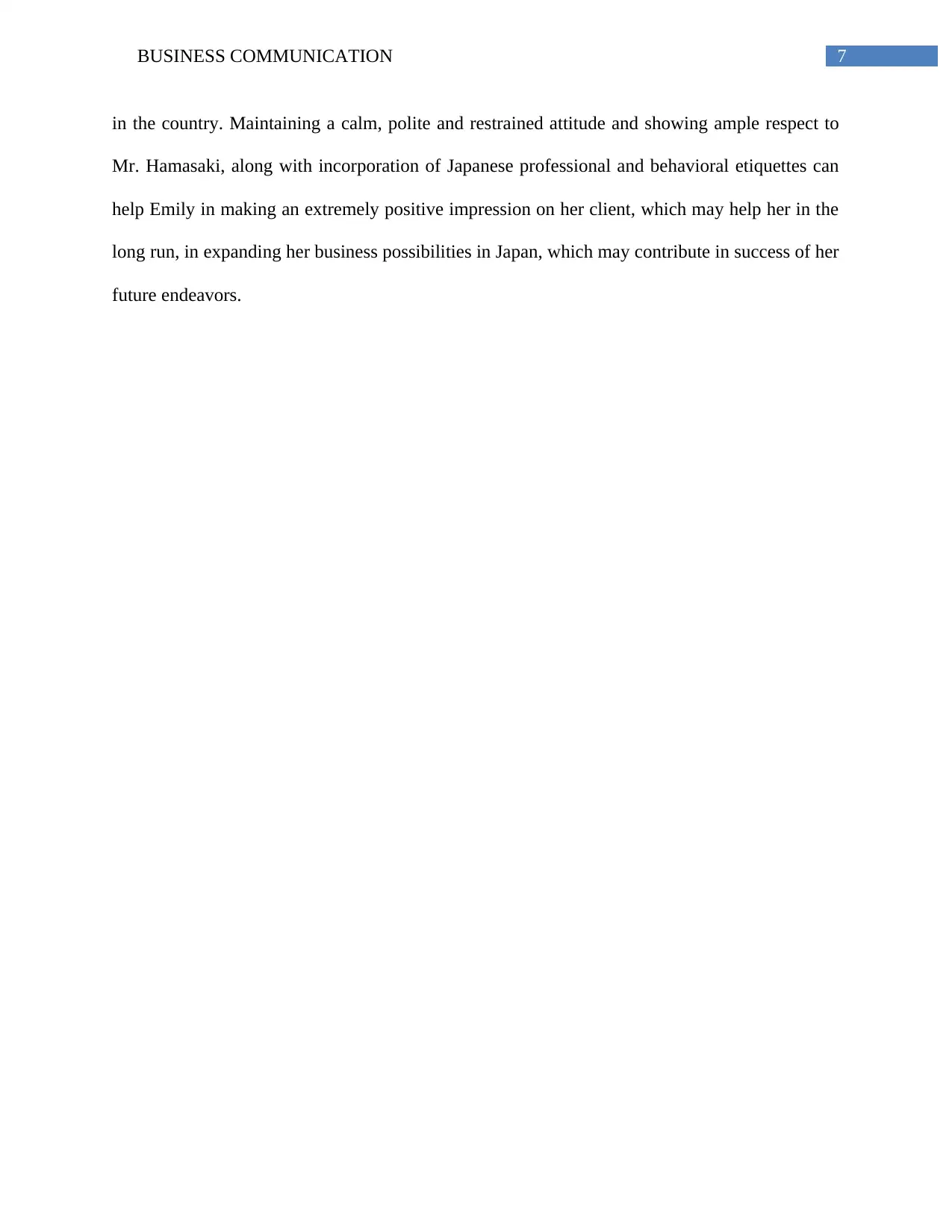
7BUSINESS COMMUNICATION
in the country. Maintaining a calm, polite and restrained attitude and showing ample respect to
Mr. Hamasaki, along with incorporation of Japanese professional and behavioral etiquettes can
help Emily in making an extremely positive impression on her client, which may help her in the
long run, in expanding her business possibilities in Japan, which may contribute in success of her
future endeavors.
in the country. Maintaining a calm, polite and restrained attitude and showing ample respect to
Mr. Hamasaki, along with incorporation of Japanese professional and behavioral etiquettes can
help Emily in making an extremely positive impression on her client, which may help her in the
long run, in expanding her business possibilities in Japan, which may contribute in success of her
future endeavors.
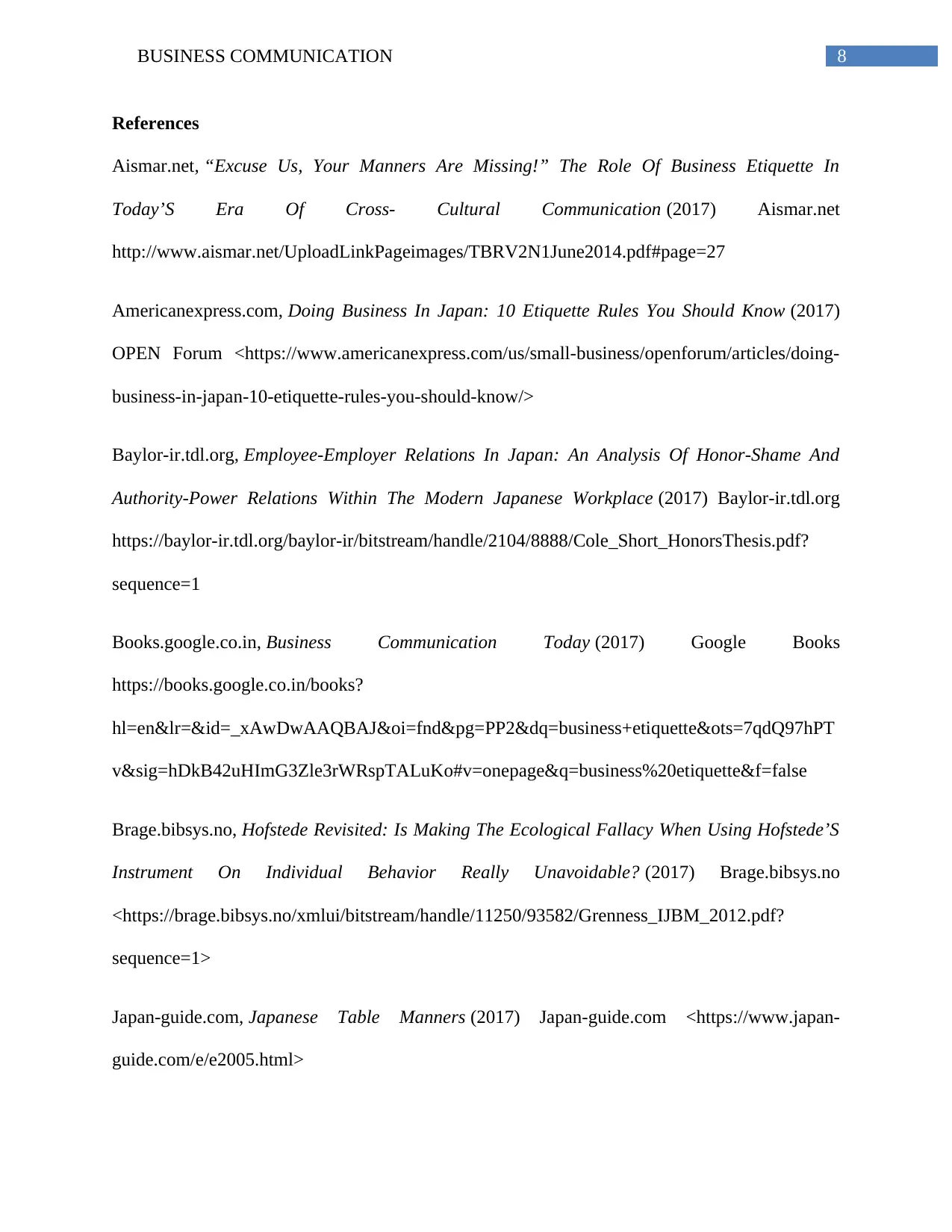
8BUSINESS COMMUNICATION
References
Aismar.net, “Excuse Us, Your Manners Are Missing!” The Role Of Business Etiquette In
Today’S Era Of Cross- Cultural Communication (2017) Aismar.net
http://www.aismar.net/UploadLinkPageimages/TBRV2N1June2014.pdf#page=27
Americanexpress.com, Doing Business In Japan: 10 Etiquette Rules You Should Know (2017)
OPEN Forum <https://www.americanexpress.com/us/small-business/openforum/articles/doing-
business-in-japan-10-etiquette-rules-you-should-know/>
Baylor-ir.tdl.org, Employee-Employer Relations In Japan: An Analysis Of Honor-Shame And
Authority-Power Relations Within The Modern Japanese Workplace (2017) Baylor-ir.tdl.org
https://baylor-ir.tdl.org/baylor-ir/bitstream/handle/2104/8888/Cole_Short_HonorsThesis.pdf?
sequence=1
Books.google.co.in, Business Communication Today (2017) Google Books
https://books.google.co.in/books?
hl=en&lr=&id=_xAwDwAAQBAJ&oi=fnd&pg=PP2&dq=business+etiquette&ots=7qdQ97hPT
v&sig=hDkB42uHImG3Zle3rWRspTALuKo#v=onepage&q=business%20etiquette&f=false
Brage.bibsys.no, Hofstede Revisited: Is Making The Ecological Fallacy When Using Hofstede’S
Instrument On Individual Behavior Really Unavoidable? (2017) Brage.bibsys.no
<https://brage.bibsys.no/xmlui/bitstream/handle/11250/93582/Grenness_IJBM_2012.pdf?
sequence=1>
Japan-guide.com, Japanese Table Manners (2017) Japan-guide.com <https://www.japan-
guide.com/e/e2005.html>
References
Aismar.net, “Excuse Us, Your Manners Are Missing!” The Role Of Business Etiquette In
Today’S Era Of Cross- Cultural Communication (2017) Aismar.net
http://www.aismar.net/UploadLinkPageimages/TBRV2N1June2014.pdf#page=27
Americanexpress.com, Doing Business In Japan: 10 Etiquette Rules You Should Know (2017)
OPEN Forum <https://www.americanexpress.com/us/small-business/openforum/articles/doing-
business-in-japan-10-etiquette-rules-you-should-know/>
Baylor-ir.tdl.org, Employee-Employer Relations In Japan: An Analysis Of Honor-Shame And
Authority-Power Relations Within The Modern Japanese Workplace (2017) Baylor-ir.tdl.org
https://baylor-ir.tdl.org/baylor-ir/bitstream/handle/2104/8888/Cole_Short_HonorsThesis.pdf?
sequence=1
Books.google.co.in, Business Communication Today (2017) Google Books
https://books.google.co.in/books?
hl=en&lr=&id=_xAwDwAAQBAJ&oi=fnd&pg=PP2&dq=business+etiquette&ots=7qdQ97hPT
v&sig=hDkB42uHImG3Zle3rWRspTALuKo#v=onepage&q=business%20etiquette&f=false
Brage.bibsys.no, Hofstede Revisited: Is Making The Ecological Fallacy When Using Hofstede’S
Instrument On Individual Behavior Really Unavoidable? (2017) Brage.bibsys.no
<https://brage.bibsys.no/xmlui/bitstream/handle/11250/93582/Grenness_IJBM_2012.pdf?
sequence=1>
Japan-guide.com, Japanese Table Manners (2017) Japan-guide.com <https://www.japan-
guide.com/e/e2005.html>
⊘ This is a preview!⊘
Do you want full access?
Subscribe today to unlock all pages.

Trusted by 1+ million students worldwide
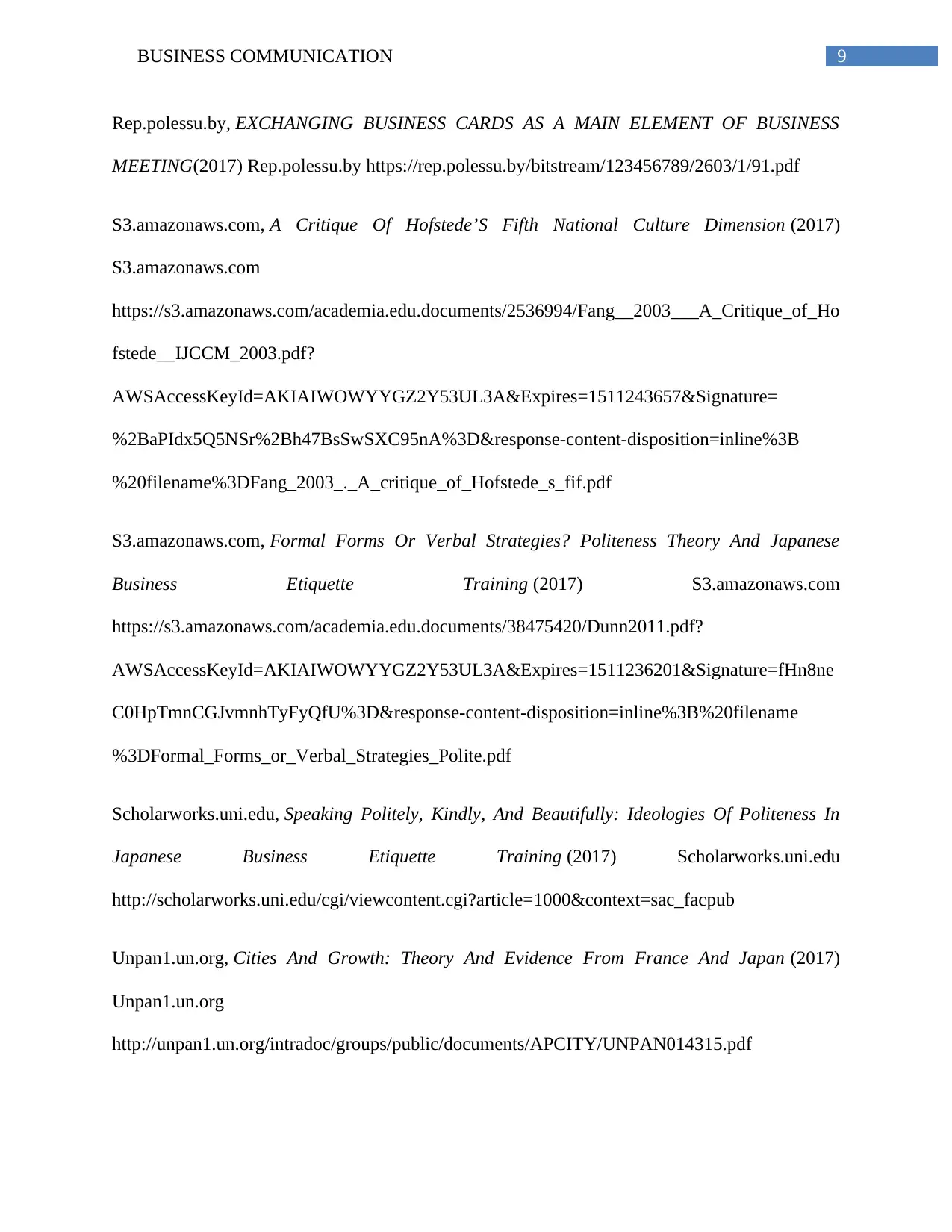
9BUSINESS COMMUNICATION
Rep.polessu.by, EXCHANGING BUSINESS CARDS AS A MAIN ELEMENT OF BUSINESS
MEETING(2017) Rep.polessu.by https://rep.polessu.by/bitstream/123456789/2603/1/91.pdf
S3.amazonaws.com, A Critique Of Hofstede’S Fifth National Culture Dimension (2017)
S3.amazonaws.com
https://s3.amazonaws.com/academia.edu.documents/2536994/Fang__2003___A_Critique_of_Ho
fstede__IJCCM_2003.pdf?
AWSAccessKeyId=AKIAIWOWYYGZ2Y53UL3A&Expires=1511243657&Signature=
%2BaPIdx5Q5NSr%2Bh47BsSwSXC95nA%3D&response-content-disposition=inline%3B
%20filename%3DFang_2003_._A_critique_of_Hofstede_s_fif.pdf
S3.amazonaws.com, Formal Forms Or Verbal Strategies? Politeness Theory And Japanese
Business Etiquette Training (2017) S3.amazonaws.com
https://s3.amazonaws.com/academia.edu.documents/38475420/Dunn2011.pdf?
AWSAccessKeyId=AKIAIWOWYYGZ2Y53UL3A&Expires=1511236201&Signature=fHn8ne
C0HpTmnCGJvmnhTyFyQfU%3D&response-content-disposition=inline%3B%20filename
%3DFormal_Forms_or_Verbal_Strategies_Polite.pdf
Scholarworks.uni.edu, Speaking Politely, Kindly, And Beautifully: Ideologies Of Politeness In
Japanese Business Etiquette Training (2017) Scholarworks.uni.edu
http://scholarworks.uni.edu/cgi/viewcontent.cgi?article=1000&context=sac_facpub
Unpan1.un.org, Cities And Growth: Theory And Evidence From France And Japan (2017)
Unpan1.un.org
http://unpan1.un.org/intradoc/groups/public/documents/APCITY/UNPAN014315.pdf
Rep.polessu.by, EXCHANGING BUSINESS CARDS AS A MAIN ELEMENT OF BUSINESS
MEETING(2017) Rep.polessu.by https://rep.polessu.by/bitstream/123456789/2603/1/91.pdf
S3.amazonaws.com, A Critique Of Hofstede’S Fifth National Culture Dimension (2017)
S3.amazonaws.com
https://s3.amazonaws.com/academia.edu.documents/2536994/Fang__2003___A_Critique_of_Ho
fstede__IJCCM_2003.pdf?
AWSAccessKeyId=AKIAIWOWYYGZ2Y53UL3A&Expires=1511243657&Signature=
%2BaPIdx5Q5NSr%2Bh47BsSwSXC95nA%3D&response-content-disposition=inline%3B
%20filename%3DFang_2003_._A_critique_of_Hofstede_s_fif.pdf
S3.amazonaws.com, Formal Forms Or Verbal Strategies? Politeness Theory And Japanese
Business Etiquette Training (2017) S3.amazonaws.com
https://s3.amazonaws.com/academia.edu.documents/38475420/Dunn2011.pdf?
AWSAccessKeyId=AKIAIWOWYYGZ2Y53UL3A&Expires=1511236201&Signature=fHn8ne
C0HpTmnCGJvmnhTyFyQfU%3D&response-content-disposition=inline%3B%20filename
%3DFormal_Forms_or_Verbal_Strategies_Polite.pdf
Scholarworks.uni.edu, Speaking Politely, Kindly, And Beautifully: Ideologies Of Politeness In
Japanese Business Etiquette Training (2017) Scholarworks.uni.edu
http://scholarworks.uni.edu/cgi/viewcontent.cgi?article=1000&context=sac_facpub
Unpan1.un.org, Cities And Growth: Theory And Evidence From France And Japan (2017)
Unpan1.un.org
http://unpan1.un.org/intradoc/groups/public/documents/APCITY/UNPAN014315.pdf
Paraphrase This Document
Need a fresh take? Get an instant paraphrase of this document with our AI Paraphraser

10BUSINESS COMMUNICATION
Venturejapan.com, Secrets Of Japanese Business Etiquette – Venture Japan (2017) Doing
business in Japan http://www.venturejapan.com/business-in-japan/doing-business-in-japan/
secrets-of-japanese-business-etiquette/
Venturejapan.com, Secrets Of Japanese Business Etiquette – Venture Japan (2017) Doing
business in Japan http://www.venturejapan.com/business-in-japan/doing-business-in-japan/
secrets-of-japanese-business-etiquette/
1 out of 11
Related Documents
Your All-in-One AI-Powered Toolkit for Academic Success.
+13062052269
info@desklib.com
Available 24*7 on WhatsApp / Email
![[object Object]](/_next/static/media/star-bottom.7253800d.svg)
Unlock your academic potential
Copyright © 2020–2026 A2Z Services. All Rights Reserved. Developed and managed by ZUCOL.





